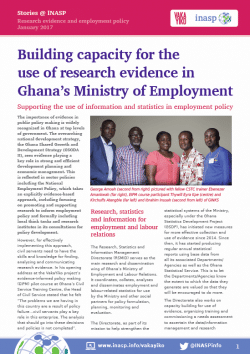
Policy highlights:
- The importance of evidence in policy making is increasingly being recognized in Ghanaian development strategies. However, to effectively incorporate such evidence, civil servants need to have the skills and knowledge to find, analyse and communicate research evidence. In Ghana, the Civil Service Training Centre (CSTC) is partnering with the Ghana Information Network for Knowledge Sharing (GINKS) to pilot and adopt a new training course designed by the VakaYiko consortium on evidence-informed policy. Three lessons have been identified from the pilot project:
- 1) Training on practical processes is widely appreciated by policymakers. Pre- and post-assessment scores showed a significant improvement in participants’ knowledge of evidence-informed policy making, with an average increase of 31%.
- 2) Moving from ‘evidence-based’ to ‘evidence-informed’ policy making is useful and makes training more applicable to the realities of policymakers. This conceptualization recognizes the complexity of using knowledge in a policy environment and acknowledges that evidence is but one factor influencing policy. This approach allows policy makers to systematically consider and reject evidence (after an informed debate). It also reflects the need for multiple types and pieces of research to inform policy, thereby increasing neutrality and considering multiple points of view on an issue.
- 3) Training is most effective when it builds on existing systems and activities. This allows for tapping into trends concerning evidence-based policy making and allows for successful elements of the training to be adopted into the system.






